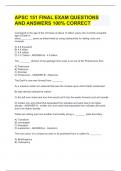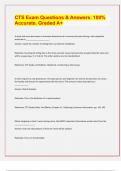Exam (elaborations)
APSC 151 FINAL EXAM QUESTIONS AND ANSWERS 100% CORRECT
- Course
- Institution
APSC 151 FINAL EXAM QUESTIONS AND ANSWERS 100% CORRECTAPSC 151 FINAL EXAM QUESTIONS AND ANSWERS 100% CORRECTAPSC 151 FINAL EXAM QUESTIONS AND ANSWERS 100% CORRECTAPSC 151 FINAL EXAM QUESTIONS AND ANSWERS 100% CORRECTCompared to the age of the Universe of about 14 billion years, the currently accept...
[Show more]




